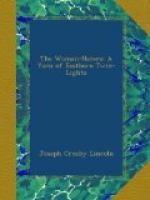“‘He is Abner’s brother,’ she says, ’and I promised Abner. I can’t tell him to go. I can’t tell him to leave this house, his brother’s house.’
“Now, consarn it, there was another thing. It was Abner’s house, or had been afore he died, and now ’twas hers. If I ever forgot that fact, which wa’n’t by no means likely to happen, Bennie D. took occasions enough to remind me of it. So I was set back again with my canvas flappin’, as you might say.
“‘No,’ says I, ‘course you can’t. He’s your brother-in-law.’
“‘But you are my husband,’ she says, lookin’ at me kind of queer. Anyhow, it seems kind of queer to me now. I’ve thought about that look a good deal since, and sometimes I’ve wondered if—if . . . However, that’s all past and by.
“‘Yes,’ I says, pretty average bitter, ’but second husbands don’t count for much.’
“’Some of ’em don’t seem to, that’s a fact,’ she says.
“‘By jiminy,’ I says, ‘I don’t count for much in this house.’
“‘Yes?’ says she. ‘And whose fault is that?’
“Well, I was mad. ‘I tell you what I can do,’ I sings out. ’I can quit this landlubber’s job where I’m nothin’ but a swab, and go to sea again, where I’m some account. That’s what I can do.’
“She turned and looked at me.
“’You promised me never to go to sea again, she says.
“‘Humph!’ says I; ‘some promises are hard to keep.’
“‘I keep mine, hard or not,’ says she. ‘Would you go away and leave me?’
“‘You’ve got Brother Bennie,’ says I. ‘He’s a genius; I ain’t nothin’ but a man.’
“She laughed, pretty scornful. ‘Are you sartin you’re that?’ she wanted to know.
“‘Not since I been livin’ here, I ain’t,’ I says. And that ended that try of makin’ up.
“And from then on it got worse and worse. There wan’t much comfort at home where the inventor was, so I took to stayin’ out nights. Went down to the store and hung around, listenin’ to fools’ gabble, and wishin’ I was dead. And the more I stayed out, the more Bennie D. laughed and sneered and hinted. And then come that ridic’lous business about Sarah Ann Christy. That ended it for good and all.”
Seth paused in his long story and looked out across the starlit sea.
“Who was Sarah Ann?” asked Brown. The lightkeeper seemed much embarrassed.
“She was a born fool,” he declared, with emphasis; “born that way and been developin’ extry foolishness ever since. She was a widow, too; been good lookin’ once and couldn’t forget it, and she lived down nigh the store. When I’d be goin’ down or comin’ back, just as likely as not she was settin’ on the piazza, and she’d hail me. I didn’t want to stop and talk to her, of course.”
“No, of course not.”




